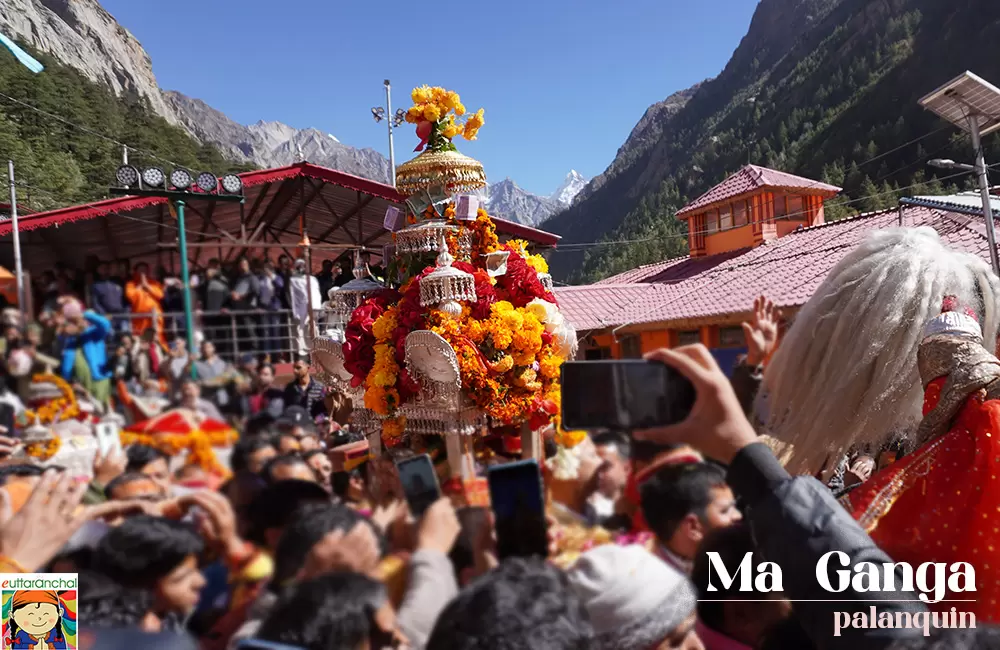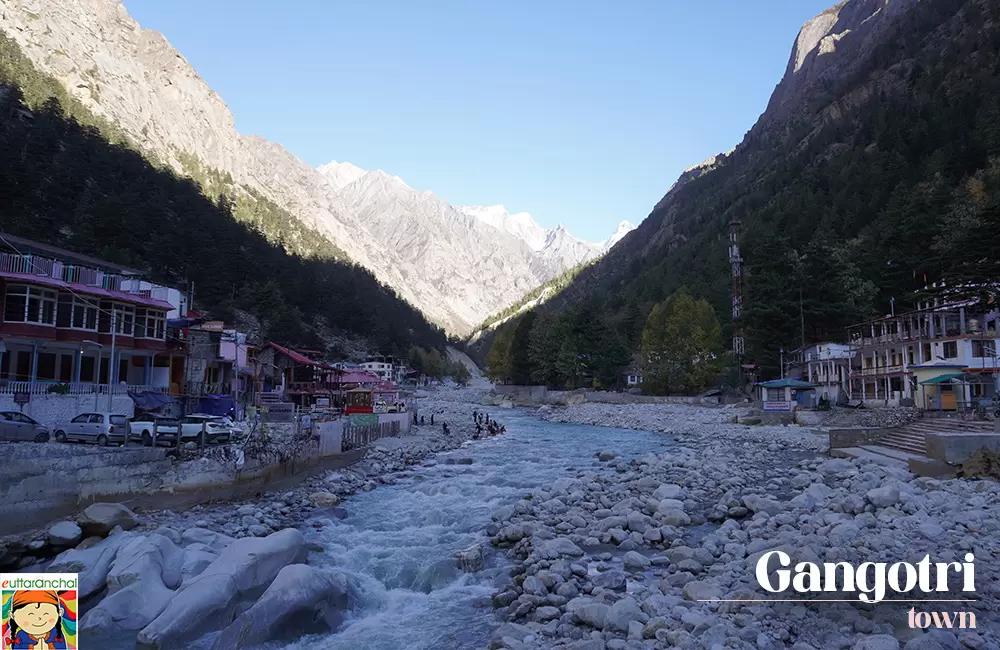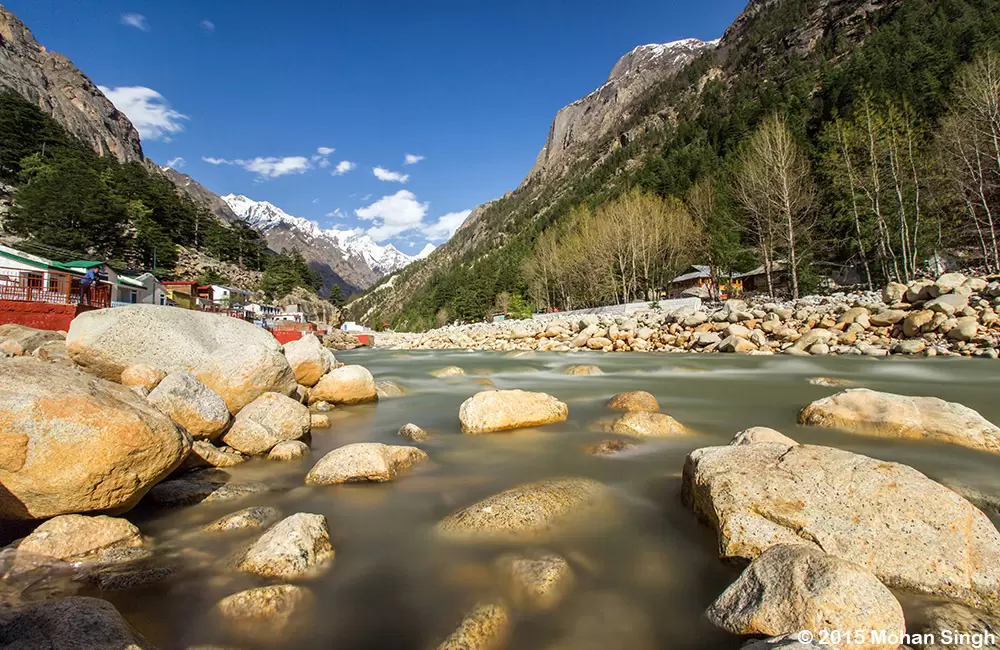Gangotri is a small town centered around the temple of Gangotri temple and is one of the holy places among the four Char Dhams. It is the highest and the most important temple of river Ganga which is worshiped as a Goddess in India.
The origin of the holy river is at Gaumukh, set in the Gangotri glacier that can be accessed by a short 19 km trek from Gangotri. But according to Hindu mythology, Gangotri is the place where river Ganga descended from heaven when Lord Shiva released the mighty river from his luscious locks.
Latest Gangotri Travel Guide 2026
Contact us for a free travel quote and Gangotri itinerary for your travel plans.
Gangotri along with the Yamunotri, Badrinath, and Kedarnath forms the Chota Char Dham which is an important pilgrimage place of the Hindus. Like other Chota Char Dhams, the Gangotri temple also closes during the winter season. During which the idol of the goddess is shifted to Ma Ganga temple in Mukhba village, about 20 km downstream. The town Gangotri remains open from May and gets closed on the occasion of Diwali festival.
There are many shops which sell prasads and light weight cans to carry water from Gangotri after Darshan. Holy Ganga water is pure and used in poojas or offering in temple. There are Ashrams and few hotels located on the other side of temple for tourists and pilgrims accommodation.
The Gangotri Temple traditionally reopens on the auspicious occasion of Akshay Tritiya. This year Gangotri Temple will open on 19 April 2026.
Gangotri Temple Opening Date 2026
Last year, the Gangotri Temple reopened for pilgrims on 30 April 2025 and closed for winters on 22 Oct 2025.
The doli of Maa Ganga departed from Mukhba Village, the winter abode of Gangotri, on April 29 and arrived at Gangotri Dham on April 30, 2025. The sacred portals of the temple were reopened to pilgrims at 10:30 AM, accompanied by the chanting of Vedic hymns. Chief Minister, Pushkar Singh Dhami also attended the inaugural ceremony at Gangotri Temple.
More details about Opening and Closing Dates of Gangotri Temple.

Gangotri is a perfect place to enrapture in the serenity and sanctity as the place has a picturesque landscape. With the snow-clad Himalayas located in the vicinity and the Bhagirathi River flowing in eternity at this heavenly place, one can feel close to God in the blissful aura of Gangotri. One can pay obeisance at the Gangotri temple which stands at an altitude of 3,415 meters above sea level. Gangotri offers scenic vistas of rugged terrains, gushing water of Bhagirathi River and snow-clad peaks.
Gangotri is also the starting point for some trek routes like Tapovan, Bhojwasa, Gaumukh, Gangotri glacier, Gangotri national park, Shivling peak, etc. Some of the popular tourist attractions in and around Gangotri town are the Gangotri temple, Bhagirath Shila, Pandava Gufa, Tapovan, Bhairon Ghati, the Gaumukh glacier, and the submerged Shivalinga.
Gangotri is one of the origin sources of Holy River Ganga (Ganges), and one of the important Char Dham pilgrimage in Hindu Religion. The main origin of the river is “Gaumukh” which is a glacier located 19 km away from gangotri temple. Ganga river is the longest and most sacred river in world.
Gangotri is located at an altitude of 3100 meters above sea level, on the banks of Bhagirathi river.
Note: It is said that at the time of construction of temple, Gaumukh Glacier was here but receded to it's present location due to global warming.

The Temple of Gangotri Dham is closed during winters, you can check the closing and opening dates here. Winter seat of Gangotri is located in Mukhwa. Know more about Winter Char Dham Yatra, Mukhba Tourism.
Fresh snowfall has been reported on high Himalayan peaks, including Kedarnath, Gangotri, and Nanda Devi, while lower hilly regions witnessed rainfall. Meanwhile, the India Meteorological Department (IMD) has issued an orange alert for heavy rain, hailstorms, and thunderstorms in several districts of Uttarakhand for Tuesday.
Gangotri National Park, located in Uttarkashi and bordering China, has been closed for the winter season. The park received 29,162 tourists this year, generating a revenue of ?80.96 lakh.
Forest officials have installed camera traps to monitor wildlife, including around 35 snow leopards, during the winter closure. The park is scheduled to reopen on April 1. Check snow leopard tours in Uttarakhand.
Trekking: Perched at an elevation of 3,000 meters, Gangotri shrine is nestled amidst the imposing lush green hills as the river Ganges flows beside the shrine. There are many places in the vicinity where one could trek and enjoy the mesmerizing Himalayan views.
Pilgrimage: Gangotri shrine is one of the four revered Char Dham in Uttarakhand and is dedicated to Goddess Ganga. Every year, thousands of devotees visit the Gangotri temple to seek blessings from the Goddess Ganga for a happy and fulfilling life.
Shopping: Since Gangotri is a revered place, there are many shops which sell religious idols of deities and other devotional items. One can buy local handicrafts such as shawls, woolens, religious paintings and Tibetan artifacts at Gangotri.
Being a revered pilgrimage for Hindus, Gangotri has various types of accommodations – ranging from luxury hotels to budget guesthouses to Dharamashala's. In addition to that, they also have camping accommodations for tourists and pilgrims. The government has also set up GMVN guesthouses. During the peak season, Gangotri is flocked with pilgrims and finding a place to stay is difficult.
There are plenty of restaurants and roadside food stalls in Gangotri where north Indian vegetarian food is served along with a few popular Chinese dishes. Since Gangotri hold deep religious values for devotees, alcohol and non-vegetarian food is banned in and around Gangotri. Apart from that one can find eating options at the hotels which have an in-house restaurant.
The sacred Gangotri town is built around the holy Gangotri shrine, having it as the epicenter. The aboriginal Gangotri temple was built in the early 18th century by the mighty Gorkha General, Amar Singh Thapa and was later rebuilt by the Maharaja of Jaipur.
There are two mythological tales associated with Gangotri, the first one states that King Sagar, the great grandfather of King Bhagirath wanted to extend his empire, for which he performed the 'Ashwamedha Yagya'. When he was busy in performing the Yagya, his horse was let loose to roam freely across the empire. When the soldiers were unable to locate the horse, the 60,000 sons of King Sagar were asked to find it. While searching for the horse, the sons of King Sagar came across a place where sage Kapila was meditating and noticed that the horse was tied next to him. They interrupted sage Kapila's meditation and accused him of stealing the horse.
Sage Kapila who was pot boiled turned all the 60,000 sons of King Sagar into ashes, cursing them to attain heaven only when the ashes will come in contact with the holy water of river Ganga, (which used to flow only in the heaven). Therefore, King Bhagirath did a serious penance to please river Ganga so that his ancestors could achieve ‘moksha’ or salvation. The penance lasted for more than 1,000 years and King Bhagirath was able to appease the holy river Ganga, to come down to Earth from the heavens above.
While the other legend states that responding to the King Bhagirath’s prayers, Ganga agreed to come down to Earth, also warning that her rapid downpour will annihilate the Earth. Therefore, Lord Shiva held the soaring river Ganga in his luscious locks to save the entire mankind. It is believed that the site where Jalmagna Shivlinga lies is the place where Lord Shiva received the Goddess Ganga in his locks. When the river Ganga started flowing on Earth, the Gangotri temple was erected to shelter her.
Day 1: Delhi- Haridwar / Rishikesh
Distance: 230kms
Time taken: 5-6hrs
Highlights: Har ki Pauri aarti in the evening, temple visits, local delicacies of Haridwar
The journey from Delhi to Haridwar is a smooth one and it will take around 5-6hrs to reach Haridwar. You can either board a train or take a bus to Haridwar. It is advisable to leave early so that you don’t miss the evening aarti at the shores of River Ganga (Har ki Pauri) in Haridwar. You will stay overnight at Haridwar and begin your journey early in the morning.
Note: If you are using public transport to travel then reach Rishikesh because it has plenty of buses and sharable jeeps option towards Uttarkashi or Gangotri. Also, you can book your train ticket to Dehradun too for more public transport options.Day 2: Haridwar- Uttarkashi
Distance: 200kms
Time taken: 6-7hrs
Highlights: Nehru Institute of Mountaineering, Vishwanath temple, Maneri Dam & Bhagirathi river
Post breakfast, begin your journey for Uttarkashi. The route to Uttarkashi goes via Chamba. You will start seeing the Himalayan peaks as you move ahead in the journey. You’ll have your lunch en-route Uttarkashi. The route is extremely scenic and you will have a pleasant journey. Explore Uttarkashi and visit India’s Nehru Mountaineering Institute.
Day 3: Uttarkashi- Harsil- Gangotri
Distance: 100kms
Time taken: 2.5hrs
Highlights: Wilson cottage, Sat Tal, Gangnani, Gangotri temple
You’ll have your breakfast at Uttarkashi and leave for Gangotri. You’ll have your lunch at Harsil and spend some time exploring the beautiful village. Visit Wilson cottage, Sat Tal and Gangnani (hot water spring). Post lunch you’ll leave for Gangotri which will take around 1 hour. You’ll ride through dense deodar forests with snow-capped mountains surrounding you.

Situated on the banks of River Bhagirathi, Gangotri Temple will fill your soul with calm and peace. The picturesque location and the giant Himalayas encompassing the place makes it look surreal. You can pray here and explore the temple premises. You will return back to Uttarkashi the same day and stay overnight there after having dinner.
Day 4: Uttarkashi- Haridwar- Delhi
Distance: 430kms
Time taken: 12-14hrs
You’ll have your breakfast at Uttarkashi early in the morning and then leave for Haridwar. The journey passes through scenic landscapes and will provide you with the much-needed rest.
Try to find a seat on the window side as the cool breeze throughout the journey will freshen you up. You will have your lunch at Haridwar and leave for Delhi on the same day. You’ll reach Delhi by the night time and that’ll mark the end of your trip.

Check out the Gangotri weather report for February
The minimun and maximum temperature in February in Gangotri is 1°C and 12°C respectively. The weather is generally covered with snow in February and you would feel chilling cold throughout the day. Heavy Woolen clothes are recommended for Gangotri in February.
Gangotri is famous among tourist as Gangotri Temple, Base of Popular Treks and Expedition, Pilgrimage, Char Dham, Temple.
Gangotri is recommended destination for Family and Kids, Foreigners, Groups, Solo.
Gangotri is popular destination for following activities/ interests - Adventure, Base Camps (Trek), Pilgrimage, Temples.

Although the Ganga originates 18 km higher up in the Himalayas, Gangotri is considered its starting point. The river is also called Bhagirathi, in honor of the great king who brought the holy river to Earth through his deep devotion. Maa Ganga stays in Gangotri until around Diwali and then closed down for six months. During our visit, we performed a ritual for our ancestors, offering prayers on the banks of the river. We also collected holy water from the sacred Bhagirathi/Ganga.
Early in the morning, before 7:00 AM, we set off from Uttarkashi for Gangotri Dham. The scenic drive spanned approximately 100 km and took around 3 hours to reach the sacred Gangotri temple, with beautiful views throughout the journey via the picturesque Harsil Valley. Our vehicle was parked about 500 meters away from the temple, and it was an easy walk from there. A wheelchair facility is provided here, and for the return trip for one of our elderly members, we paid INR 500. This temple of Goddess Ganga is said to have descended on earth from heaven. Here the river is Bhagirathi after the king Bhagirath, who sat in meditation to have this river on earth. It becomes the Ganges at Rudraprayag when it meets the Alaknanda river.We visited in the last week of October, and due to the cold weather, very few people were at the temple, allowing us to have an excellent darshan without any waiting time. We even employed a panda who conducted puja by the side of river Bhagirathi. Gangotri is situated at 10,000 ft altitude. We spent around couple of hours and there were few restaurants serving tea and breakfast. It would be great if visited in September-October so one avoids all those long queues. Jai Maa Gange, Har Har Gange!
I visited Gangotri Temple as part of a spiritual journey to Uttarakhand. The trip began from Haridwar, where we traveled by road, making stops at scenic towns like Uttarkashi along the way. We reached Gangotri after a long but beautiful drive, passing through hilly terrain and picturesque landscapes.
The visit to the temple was serene and peaceful, offering both spiritual enrichment and a chance to witness the breathtaking beauty of the Himalayas.Gangotri Temple, the highest temple dedicated to Goddess Ganga, is one of the Chota Char Dham pilgrimage sites in Uttarakhand.
The Bhagirathi River, one of the main sources of the Ganga, flows beside the temple.Inside the sanctum, the idol of Goddess Ganga is worshipped along with idols of Goddess Yamuna, Annapurna, Saraswati, Lakshmi, Bhagirath, and Adi Shankaracharya. Nearby, small temples are dedicated to Lord Shiva, Ganesha, Hanuman, and Bhagirathi.Gangotri is not only a spiritual site but also offers breathtaking natural beauty.
According to legend, the Ganga descended to Earth here after Lord Shiva released it from his locks to save the planet, dividing the river into seven streams.The river originates at Gaumukh, located 19 km from Gangotri at the base of the Gangotri Glacier, accessible by trekking.
The river is called Bhagirathi until it merges with the Alaknanda at Devaprayag, where it becomes the Ganga.The temple is built near "Bhagirath Shila," where King Bhagirath prayed for Ganga’s descent. Pilgrims often collect holy water from here to take back home.